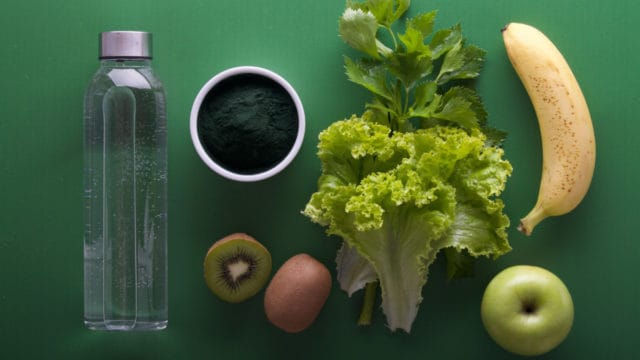
Fitness and nutrition: What you need to know
“You are what you eat” – we’ve all heard that before. But there’s a lot of truth in that saying. When you eat a healthy diet, you’re doing something good for your body and your mood, as well as boosting your general well-being and positively influencing your health.
When it comes to training, a balanced and varied diet is crucial to your progress. So we asked nutritionist and food scientist Marina Röwert to share her idea of an optimal diet that supports training. Maria’s an expert on nutrition and fitness at nutritious snack company nu3 and helps health-conscious people achieve optimal health, long-term.
Click here to find out how to boost your immune system through food.
Fit in February
Together with nu3 we want to help you get fit through the cold and wet month of February. That’s why Urban Sports Club and nu3 are teaming up with partner locations to invite you to a series of digital community events, held on Thursdays. The program is diverse and varied:
- February 04: Martial Arts for body and mind at Chimosa
- Feb. 11: Fitness class by Kader 1, combining strength building with a short but sweet HIIT session
- Feb. 18: Budokon Yoga practice by Holy Wow Yoga, which combines the style of vinyasa yoga with elements of various martial arts
- February 25: Hip hop and open dance floor by Flying Steps
If you participate in our online event series, you’ll receive a voucher for smart supplements from nu3 that will support your new healthy lifestyle, and you’ll be in with the chance to win tons of great prizes. Click here to register.
To make sure you eat right before and after these courses, Maria Röwert shares some practical tips to enjoy healthy nutrition alongside your sports routine:
Eat a varied and wholesome diet
Carbohydrates, protein, nutrients, vitamins and minerals are important for athletes at a high level. According to Maria Röwert, a consistent, varied diet is the best way to guarantee optimal energy and nutrient intake for recreational and amateur athletes. “The most important thing in sports nutrition is a healthy mix of plenty of plant foods as well as moderate amounts of meat, dairy and fat.”
Carbohydrates should not be missed. Marathon runners eat more pasta, rice and potatoes before a race for a reason. “Complex carbohydrates are extremely important for muscle growth and regeneration and are used efficiently by the body during sport – more so than protein and fat, for example,” explains Maria. The goal of “carb-loading” is to provide energy for sustained exercise.
According to Maria, refuelling is key to sports nutrition. Once the carbohydrate stores are empty, you can experience a rapid drop in performance as well as hunger pangs.
Eating right before training
Are you an early bird or a night owl? If you’re the type of person who prefers to workout early in the morning, you should definitely eat breakfast before you exercise. Overnight, your carbohydrate stores are emptied and protein synthesis is running at full speed. This means that in the morning, the energy you need for training is scarce. With just a bite of easily digestible carbohydrates, such as a slice of bread with cottage cheese and honey or a light roll (not wholemeal) with cream cheese, you’ll have more energy to train.
If you want to work out early but can’t eat early in the morning, Maria says it’s best to limit yourself to a snack. “To avoid hypoglycemia, beginners should take a snack with them for a longer workout (more than 90 minutes), such as a granola bar or piece of fruit.”
Exercise in the morning or evening? Here are the pros and cons.
Eat smart and recover faster
Eating right helps you make the most of your rest periods after exercise by speeding up your recovery and preventing muscle soreness and fatigue.
Maria recommends a light snack, ideally about 60 – 90 minutes after exercise. Easily digestible carbohydrates, combined with high-quality protein, are particularly suitable. Here are some examples:
- Chicken breast fillet, cheese, egg or ham rolls
- Baked potato with sour cream or salmon
- Asian noodles with chicken meat
- Steamed fish with rice and salad
- Jacket potatoes with cottage cheese or egg (omelet, fried egg, scrambled egg)
All of these meals combine plant and animal protein. “Biologically, this mix is particularly valuable when it comes to building muscle,” Maria says.
The influence of iron on athletic performance
Iron is the most abundant trace element in the body and is closely related to our energy balance and thus our performance. Female athletes in particular should pay attention to their iron levels – even a short-term undersupply leads to rapid fatigue, listlessness and a drop in performance. A permanent iron deficiency can even impair the resilience, endurance and resistance of your entire body.
That’s why Maria recommends getting enough iron in your diet: “The main sources of iron in a typical mixed diet are bread, meat, sausage and vegetables, especially dark green leafy vegetables as well as beets and pumpkin.”
Would you have guessed that vitamin C can aid iron in-take? Just a squeeze of lemon juice on your meat dishes can significantly increase iron absorption.
If you want to learn even more about nutrition while exercising, don’t miss our community event series in partnership with nu3. On February 11, following Kader 1‘s HIIT training, you can enjoy a crash course on nutrition. Sign up here!



Comments